Human strain of mad cow disease found in skin - study

Rogue proteins which cause the human equivalent of mad cow disease have been detected in the skin, raising concerns that the deadly disease could be passed through contact not involving the brain.
CJD is caused by abnormal infectious protein aggregates called prions which cause fatal damage in the brain. There is no available treatment for the disease and 90 percent of patients die within a year of onset, according to the National Institutes of Health.
Now, researchers at Case Western Reserve University School of Medicine have found that Creutzfeldt-Jakob disease (CJD) patients can harbor the infectious protein ‘prions’ in their skin as well as the brain.
Previously medical experts believed the disease was only contractible by eating infected meat or coming into contact with the brain or hormones of an infected person, such as during an autopsy.
"It is well known that CJD is transmissible via surgical or medical procedures involving prion-infected brain tissue," said Wenquan Zou, lead researcher of the study.“Our finding of infectious prions in skin is important since it not only raises concerns about the potential for disease transmission via common surgeries not involving the brain, but also suggests that skin biopsies and autopsies may enhance pre-mortem and post-mortem CJD diagnosis.”
The researchers studied skin samples from 39 patients, finding prion protein aggregates in the skin samples of all of the CJD patients. However, the levels were 1,000-100,000 times lower than in the brain, and only detectable by an extremely sensitive assay.
"The level of prion infectivity detected in CJD skin was surprisingly significant, but still much lower than that in CJD brains," said Qingzhong Kong, Associate Professor of Pathology and Neurology at Case Western.
"Prion transmission risk from surgical instruments contaminated by skin prions should be much lower than that of instruments contaminated by brain tissue," he added.
Research using lab mice showed that these skin prions are infectious, and capable of causing disease. A dozen healthy mice were exposed to skin extracts from two of the CJD patients, and all developed prion disease.
A dozen more mice were exposed to brain extracts from these patients. The results revealed that while brain degeneration was similar in both groups it took twice as long for the disease to develop in the skin group.
New hope for human patients as scientists reverse type 1 diabetes in mice https://t.co/uJRYI3a04Wpic.twitter.com/7SOT4SoZ6w
— RT (@RT_com) November 16, 2017
“Perspective is important when interpreting these outcomes,” said Byron Caughey, a senior investigator at NIAID’s Rocky Mountain Laboratories (RML) who helped oversee the study. “There is no evidence that transmission can occur in real-world situations via casual skin contact. However, the results raise transmission questions that warrant further study,” he said.
The findings also present new possibilities for less invasive techniques in CJD diagnosis, according to the team.
"Using the skin instead of brain tissue for post-mortem diagnosis could be particularly helpful in cultures that discourage brain autopsy, such as China and India. These countries have the largest populations with the greatest number of patients, but brain autopsy is often not performed," said Zou.
Medical researchers will carry out further investigation, mainly using mouse models to evaluate the potential risk of skin prion transmission through non-neurosurgeries.














